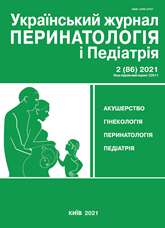Improvement of effectiveness in treatment for urinary tract infection in pregnant women
DOI:
https://doi.org/10.15574/PP.2021.86.7Keywords:
pregnancy, urinary tract infections, treatments, herbal medicine, cranberry, lactobacilliAbstract
The aim is to evaluate the effectiveness of Phytolysin Active prescription in therapy of urinary tract infections in pregnant women.
Materials and methods. The efficacy of Phytolysin Active (1 capsule per day for 21 days) in the complex treatment for urinary tract infection was studied in comparison with the group of pregnant women using traditional antimicrobial therapy. The first group consisted of 27 pregnant women who received complex treatment (antibiotic therapy + Phytolysin Active), the second consisted of 25 women who used exclusively antibiotic therapy. Among pregnant women in the first group, symptomatic gestational cystitis was observed in 9 (33.3%) cases, and in the second group in 8 (32%) patients.
Results. The effectiveness of combination therapy with the use of Phytolysin Active was proved by significant improvement in general well-being and disappearance of cystitis symptoms in 8 (88.9%) women compared with 5 (62.5%) patients in the treatment group who used exclusively antimicrobial drugs. After treatment with the addition of Phytolysin Active to antibiotic therapy, Escherichiaсoli pathogen, which is most often diagnosed in this pathology, was observed in 1 (3.7%) women compared to 5 (20%) cases in the second group. Also, 25 (92.6%) women of the first group had no recurrence of urinary tract infections for 3 months.
Conclusions. Complex treatment of asymptomatic bacteriuria in pregnant women with the use of the drug Phytolysin Active is more effective than the use of antibiotic therapy alone, which is proved by the high rate of the pathogen elimination and absence of infection recurrence for 3 months. The synergistic action of two active components of Phytolysin Active (Polpharma) – cranberry proanthocyanidins and lactobacillus acidophilus – improves the effectiveness of treatment and prevents relapse.
The study was carried out in accordance with the principles of the Declaration of Helsinki. The study protocol was approved by the Local Ethics Committee of the institution. The informed consent of women was obtained for the research.
The authors declare no conflicts of interest.
References
Ayoyi AO, Kikuvi G, Bii C, Kariuki S. (2017). Prevalence, aetiology and antibiotic sensitivity profile of asymptomatic bacteriuria isolates from pregnant women in sflected antenatal clinic from Nairobi, Kenya The Pan African Medical Journal. 26: 41. https://doi.org/10.11604/pamj.2017.26.41.10975; PMid:28451019 PMCid:PMC5398259
Centers for Disease Control and Prevention. (2010, Nov 19). Prevention of Perinatal Group B Streptococcal Disease: Revised Guidelines from CDC, 200. Recommndations and Reports. 59 (10): 1-32.
Farkash E, Wientraub AY, Sergienko R et al. (2012). Acute antepartum pyelonephritis in pregnancy: a critical analysis of risk factors and outcomes. Eur J Obstet Gyneco Reprod Biol. 162: 24-27. https://doi.org/10.1016/j.ejogrb.2012.01.024; PMid:22381037
Glaser AP, Schaeffer AJ. (2015). Urinary tract infection and bacteriuria in pregnancy. Urol Clin North Am. 42: 547-560. https://doi.org/10.1016/j.ucl.2015.05.004; PMid:26475951
Hazhir S. (2009). Asymptomatic bacteriuria in pregnant women. Urol J. 4 (1) 6: 24-27.
Matuszkiewicz-Rowinska J, Wieliczko M. (2015). Urinary tract infections in pregnancy: jld and new unresolved diagnostic and therapeutic probiems. Arch Med Sci. 11: 67-77. https://doi.org/10.5114/aoms.2013.39202; PMid:25861291 PMCid:PMC4379362
Nicolle L.E. (2005). Infectious diseases society of America guidelines for the diagnosis and treatment of asymptomatic bacteriuria in adults. Clin Infect Dis. 40: 643-654. https://doi.org/10.1086/427507; PMid:15714408
Nicolle LE. (2015). Management of asymptomatic bacteriuria in pregnant women. Lancet Infect Dis. 15 (11): 1252-1254. https://doi.org/10.1016/S1473-3099(15)00145-0
Perez-Moreno MO, Pico-Plana E, Grande-Armas et al. (2017). Group B streptococcal bacteriuria during pregnancy asd a risk factor for maternal intrapartum colonization: a prospective cohort stady. J Med Microbiol. 66 (4): 454-460. https://doi.org/10.1099/jmm.0.000465; PMid:28463661
Scharr J, Smaill F. (2008). Asymptomatic bacteriuria and symptomatic urinary tract infections in pregnancy. Eur J Clin Invest. 38 (2): 50-57. https://doi.org/10.1111/j.1365-2362.2008.02009.x; PMid:18826482
Smaill FM, Vazgyez JC. (2015, Aug). Antibiotics for asymptomatic bacteriuria in pregnancy. Cochrane Database Syst Rev. CD000490. https://doi.org/10.1002/14651858.CD000490.pub3; PMid:26252501
Downloads
Published
Issue
Section
License
The policy of the Journal “Ukrainian Journal of Perinatology and Pediatrics” is compatible with the vast majority of funders' of open access and self-archiving policies. The journal provides immediate open access route being convinced that everyone – not only scientists - can benefit from research results, and publishes articles exclusively under open access distribution, with a Creative Commons Attribution-Noncommercial 4.0 international license(СС BY-NC).
Authors transfer the copyright to the Journal “MODERN PEDIATRICS. UKRAINE” when the manuscript is accepted for publication. Authors declare that this manuscript has not been published nor is under simultaneous consideration for publication elsewhere. After publication, the articles become freely available on-line to the public.
Readers have the right to use, distribute, and reproduce articles in any medium, provided the articles and the journal are properly cited.
The use of published materials for commercial purposes is strongly prohibited.

